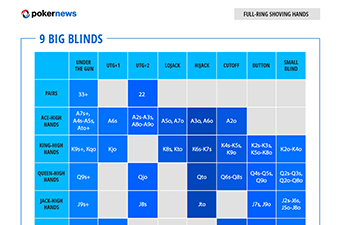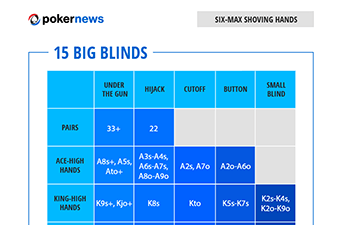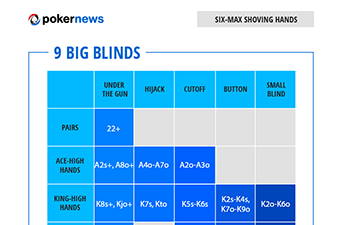Fish
A "fish" is a term used for an inexperienced or beginner poker player, usually one who loses money. An old saying is "If you can't spot the fish in your first half-hour at the table, you are the fish."
Fish Definition: What is a Fish in Poker?
A fish in poker is defined as any losing player, typically one who is inexperienced or unskilled in the game. The term is therefore considered derogatory, so you shouldn’t call an opponent this. However, some players do, to berate and insult their opponents.
Examples of fish used in a sentence
- "My opponent is a fish because they called a re-raise preflop with six-four offsuit."
- "I joined this cash game as there are a lot of fish at the table."
- "Fish are weak or inexperienced players that can be exploited in poker."
How to Spot a Fish in Poker — 5 ways to find a Fish
You now might know what a fish is, but actually spotting them at the poker table is a different challenge. Here are five ways to spot a fish in poker.
A fish will… limp a lot
Typically, you don’t want to enter a pot by just calling. Of course, there are exceptions, but for the most part limping (just calling preflop in an unraised pot) is not the optimum strategy. This is because you’ll get raised a lot, and if your hand was not good enough to raise in the first place it’s unlikely going to be good enough to call a raise — so you’re putting money into the pot and not seeing a flop.
On the other hand, if you do have a strong hand and just limp in, you’re potentially losing value preflop and also giving your opponents a chance to catch up with you with a weaker hand by seeing the flop for free.
If you see a player limping a lot, specifically from an early position, it’s a safe bet that they’re a fish.
A fish will… play out of position
Position is key in poker. One of the easiest quick fixes to your game that will help you improve drastically is learning about position. Position refers to which players’ turn it is to act, with early positions at a disadvantage by having to act (e.g. fold, call or raise) first, while the blinds have the advantage of acting last.
The advantage of playing in position is significant, but something that fish, to their detriment, will consistently overlook.
A fish will… call light
One main reason why it’s important to spot a fish is that you can get more value from them. Weaker players overvalue their own hands and don’t think through what their opponents might have. Any big bet they face, they might think they’re being bluffed even if it’s a logical large value bet, and call off with a mediocre hand - not wanting to get bluffed off the pot. Fish have a tougher time laying down hands in general and when they do hit a decent hand, will massively overplay them regardless of what their opponent could or could not have.
Look for the players that love calling multiple street bets or call off the river with weak hands - they're likely fish.
A fish will… go on tilt
Apart from the obvious one or two exceptions, Phil Hellmuth we’re looking at you here, most profitable poker players understand that going on tilt and allowing anger/frustration to impact your play is seriously going to affect your win rate. Good players realise that variance dictates that being sucked out on and losing hands from a dominant position when your opponent hits their miracle card is all part of the game.
However, how do you spot if another player is on tilt? A key indicator is that they will take to the keyboard to call their opponent a fish, donkey or [insert any other relevant poker slur here] when they lose. As mentioned, good players might be frustrated when their opponent calls light and hits their miracle out, but they understand it’s part of variance and that their opponent will likely lose in the long run if they keep playing the same way.
So, if you see a player at your table constantly reacting to bad beats and seemingly not understanding why they got sucked out on, it’s likely that their grasp of the game is limited and they’re a potential fish, ready to be exploited.
A fish places weird bet sizes
Poor players do not know the optimum bet sizes to make to get called with their strong hands and folds with their weak hands. For instance, a standard preflop raise is somewhere between 2 and 4 big blinds. A fish might look down at pocket aces and raise to 10 big blinds. Similarly, in a tournament, they might have a monster preflop and shove all-in with 50+ big blinds.
While some of the previous tips are somewhat more subtle, this type of fish behavior is far more obvious and noticeable.
How to Exploit a Fish in Poker
Okay, so you know what a fish is and you know how to spot them at the poker table, but the next (and perhaps most important) step is learning how to take advantage of the situation. Here’s how to exploit a fish in poker.
Bet big v. fish
Weak players do not want to fold their hands. If they have aces, even with their limited knowledge of the game, they know that this is the best hand in NLH, and while aces are the nuts preflop, things change when the cards come. By the river, you should definitely be playing the board rather than your hand. For instance, aces are very strong preflop but if the river comes and shows a four-card straight on the board, the strength of the aces becomes diluted.
However, fish will just see that they have aces, associate them with great strength preflop and find it tough to fold them, regardless of how the community cards fall.
So, while slow playing sometimes has value in certain scenarios, if you have a good hand and strongly believe it’s the best hand, bet, bet, bet, and take your opponent to Valuetown.
Get into pots v fish
As we defined, a fish is a weak poker player, so you want to try to play as many pots as you can against fish. This sounds obvious, but if you have a mediocre hand preflop and are not sure whether to enter into the pot or fold, it might be worth laying it down if you’re facing a strong opponent, saving your chips to battle against the fish.
Fish are far more likely to make mistakes that you can capitalize on, and are a lot less likely to give you tough decisions in later streets. It’s also more likely you’ll be able to run them over in later streets, so it’s worth taking them into deep waters where you feel far more comfortable than they do.
Understand raising actions
Fish will rarely 3 or 4-bet bluff preflop. If you’ve ever played low stakes, the amount of 3-betting and 4-betting that happens pre is very limited. When it does happen, more often than not the raiser has a monster.
So, if you’re against a fish and find yourself facing an ultra-aggressive re-raise preflop, just question how often they do this. It could be that they are just a loose-aggressive player who 3-bets 94 suited, but the majority of the time they will be betting strong with strong hands.
It’s not just about preflop action though. If a fish shoves all in on the streets for 50bbs, this says a lot about their play. Again, they could just be loose and shoving with nothing, but more likely they’ve made their hand and don’t know the best way to extract value.
While exploiting fish is largely about extracting value from them, it’s also important to follow the advice above, not go chasing profit and know when to lay down your hand.
Fish vs Donkey - What’s the Difference?
There is little difference between the terms fish and donkey in poker. Both are derogatory and both are used to describe weak and inexperienced players. One way the two terms vary slightly is that a donkey is a general slur that can be used in everyday life, whereas fish is only ever used in this context at the tables.
Is it Rude to Call Someone a Fish in Poker?
Yes, it is rude to call someone a fish. Regardless of how bad they’ve played or how annoyed you are, it’s never acceptable to call an opponent a fish in anger. It’s not exactly illegal, but it’s up for interpretation and some poker rooms may see it as abusive behaviour towards other players and therefore penalise or take action against you.
Another famous saying from the early days of online poker is, "Don't tap the glass..." This comes from an aquarium sign that continues, "...it scares the fish." If someone is a fish, you want them to keep playing for as long as possible. Don't scare them off.
How do you Stop Being a Fish in Poker?
There are no shortcuts or easy workarounds — to stop being a fish in poker you have to study and learn more about the game.
If you’ve identified the fact that you’re a fish, that’s a big and very important step. People’s egos combined with the Lake Wobegon Effect (humans’ tendency to overestimate their ability at something) means most players that are fish don’t know or think they are. This is problematic, as if you think you’re a good player when you’re not, you’re unlikely to change the way you play and improve as you don’t realize you are doing anything wrong.
Learn Preflop Ranges
So, if you know you’re a losing player, the good thing is that you can change it. To do this, start from the basics. Learn your opening ranges — i.e. what hands you should raise preflop in each position. Many players, some even more experienced, think they know exactly what hands to play and in what position, then are hugely surprised when they see the GTO raise charts.
1. Full Ring Ranges Poker Charts
2. Six-Max Ranges Poker Charts
For a full overview of all of our charts, see our 10 Poker Range Charts to Play Winning Poker page.
Playing the correct ranges preflop is essential to playing solid poker strategy. It will give you the foundations to build on to become a better, profitable poker player.
Don’t Chase Draws
A draw in poker is where you’re waiting on certain cards on later streets to complete a flush or a straight. Flushes and straights are strong hands and hitting these will usually mean you’ll win the pot — and win a big pot at that if your opponent has a weaker hand that is still deeper enough to call with.
For this reason, fish usually try too hard to make their draws, meaning they call bets with weak or no made hand at all far too often in the hope of hitting their cards. While you shouldn’t fold your draws all the time, experienced players will realize the situations where you shouldn’t chase and lay their hand down. Sure, this means they won’t potentially hit their flushes/straights, but it saves them the money of paying off turn or river bets to hope to see the required cards come. In the long run, it’s profitable.
So, when should you chase your draws? Luckily, poker is not a game of blind luck and random judgment. Using mathematical theory and precision, it’s simple to work out when to fold your draws. The equation is shown below:
Equation to calculate your equity on the flop
Number of Outs x 4 = approximate equity (%)
Equation to calculate your equity on the turn
Number of Outs x 2 = approximate equity (%)
Here, an "out" is a card that will likely make your hand stronger than your opponents — e.g. the river card makes your flush or straight.
For instance, if you have a diamond flush draw on the flop, assuming your opponent is ahead you’ll have 9 outs to hit your flush. This is because there are 13 diamonds in the deck, two are in your hand and two are from the community cards on the flop. Times those 9 outs by 4 means you have 36% equity in this hand on the flop. So, if you’re facing a raise where you only have to put in 20% of the total pot and your equity is 36%, then it is +EV to call and calling to try to hit your flush is the optimum play.
Be More Critical of Your Game
It’s easier said than done, but any pro player will tell you to leave your ego at the door when it comes to poker. Far too many weak, losing players will fail to accept their own mistakes they’ve made when they play. These are leaks in their game that need to be addressed to become profitable, but never will be.
A general, common example is when a player gets sucked out on by the river — i.e. they are a huge favorite on the turn but their opponent hits one of very few outs to make the best hand on the river. If your opponent hits their one out on the river against you, it is unlucky and you can blame losing the pot on the poker Gods for not blessing you with luck that day. And sure, it is unlucky, but what happened before the river?
Just because they got unlucky, bad players will assume it’s 100% down to luck as to why they lost their money. But, what mistakes were made preflop or on the streets? Good players are always self-critical, and win or lose will look back over how they played hands and determine what mistakes were made — AND more importantly, learn from them.
Get your Raise Sizes Right
Getting your raise sizes right can be the difference between being a losing player and being profitable. If you’re always pricing out your opponents when you have the nuts, you’re losing out on value. Equally, if you’re not charging your opponents enough with your bluffs, you can give them too cheap of a price meaning it’s +EV for them to call you down.
Even the most seasoned of pros will never raise the optimum size every hand, but it’s important to understand the value of raising the right sizes and how important it can be to your profitability.
Firstly, it’s crucial to know why you’re betting. It sounds stupid, but often fish will raise not knowing whether they are in fact bluffing or raising for value. To determine which one it is, you need to evaluate your hand and compare it to what you think your opponent is most likely to have. This is where ranges come into play. If your opponent has 4-bet you preflop, it’s likely they either have complete bluffs or the top of their range. Therefore, if you hit trip deuces on the flop, it’s very likely that you’ll be ahead in the hand, BUT more importantly, your opponent should have strong enough equity to call a flop bet. Therefore, betting big on the flop for value is safe as your opponent will want to continue with his strong holding.
On the other hand, in the same situation, if the Villain in the hand just calls a min-raise open in the BB, their range will be very wide. Therefore, you are unlikely to have your big value bet on the flop called, so should potentially go for a smaller sizing depending on the exact cards of the flop.
It’s these fine margins that are so crucial in poker.
Poker Fish FAQ
What is a fish in poker?
A fish is any bad player in poker. They may lack experience, talent, or both.
What is the difference between a fish and a donkey in poker?
There is little difference between a fish and a donkey. Both terms refer to bad players. However, a donkey has stronger associations with weak tournament players.
How to deal with fish in poker?
Generally you want to play more hands against a fish. If a fish is in a hand, you can play weaker hands, especially if you are in position.
Is a fish the same as a whale, donkey, or pigeon in poker?
A fish is similar to a pigeon or donkey in that all three are terms for bad players. A whale is a little different as this is specifically a bad player who loses large amounts of money. Either because they play high-stakes or play so badly that they burn through their bankroll quickly.






